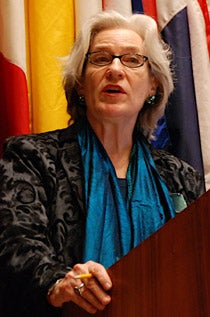
 Member countries of the Pan American Health Organization (PAHO) endorsed a five-year effort to increase gender equality in Latin America and the Caribbean by tailoring health policies and programs to the different health needs and risks faced by men and women.
Member countries of the Pan American Health Organization (PAHO) endorsed a five-year effort to increase gender equality in Latin America and the Caribbean by tailoring health policies and programs to the different health needs and risks faced by men and women.
Countries approve a five-year PAHO plan to empower women and address gender differences in health
Washington, D.C., 2 October 2009 (PAHO) — Member countries of the Pan American Health Organization (PAHO) endorsed a five-year effort to increase gender equality in Latin America and the Caribbean by tailoring health policies and programs to the different health needs and risks faced by men and women.
The endorsement came from PAHO's Directing Council, which is meeting this week in Washington, D.C. Participants include ministers of health and other high-ranking delegates from throughout the hemisphere.
The new PAHO Regional Plan of Action for Implementing the Gender Equality Policy shows that men and women have different health profiles and face different health risks, and that to be successful, efforts to improve health must take these differences into account.
For example, one in three women in the Americas suffers violence at the hands of a domestic partner, but among men, injuries and violent deaths are mostly related to traffic accidents, homicide, occupational accidents, suicide, and substance abuse.
Gender inequalities can also be seen in the Region's relatively high maternal mortality rates, unmet needs for family planning, adolescent pregnancies, high cervical cancer rates, and an increase of HIV infection among young women in many Caribbean countries.
In addition, gender affects people's access to health services. Women are more likely than men to use health services, but they also pay more out of pocket. And while women tend to live longer, older women are less likely to have social protection through pensions or insurance, since almost half of women who work devote their time to caring for others without remuneration.
Gender adversely affects men as well, especially in terms of health and life expectancy. Men engage in more risk-taking starting in childhood and continuing through adulthood, with behaviors including risky sexual encounters, violence, alcohol and substance abuse, and reluctance to practice prevention or seek health care.

Dr. Marijke Velzeboer-Salcedo (Photo by David Spitz - PAHO/WHO)
"It is extremely important for boys and young men to understand these risks and also how they can influence women's health," said Dr. Marijke Velzeboer-Salcedo, PAHO's senior advisor on gender, ethnicity and health.
The plan also emphasizes the importance of collecting and analyzing health and socioeconomic data that is disaggregated by sex, and of empowering women through stronger linkages between governments and civil society organizations, particularly women's groups.
In endorsing the plan, the Directing Council called for sex parity in hiring and career development for staff in countries' ministries of health and in PAHO itself. In recent years, the number of women appointed to professional posts at PAHO headquarters in Washington, D.C., has increased steadily. In the Organization's country offices, however, women still tend to predominate at lower levels while men occupy higher positions.
Reducing gender inequality is one of the Millennium Development Goals (MDG-3), and United Nations and other development agencies have put growing emphasis on the need to empower women to improve their contributions to development. Last week, the U.N. General Assembly approved the merger of four U.N. agencies working on gender issues into a single entity that will promote the rights and well-being of women and work toward gender equality worldwide.
Links:
PAHO, founded in 1902, works with all the countries of the Americas to improve the health and quality of life of their peoples. It also serves as the Regional Office for the Americas of the World Health Organization (WHO).
For more information please contact Donna Eberwine-Villagrán, Public Information Officer, Knowledge Management and Communication, tel (202) 974-3122, fax (202) 974-3143.



